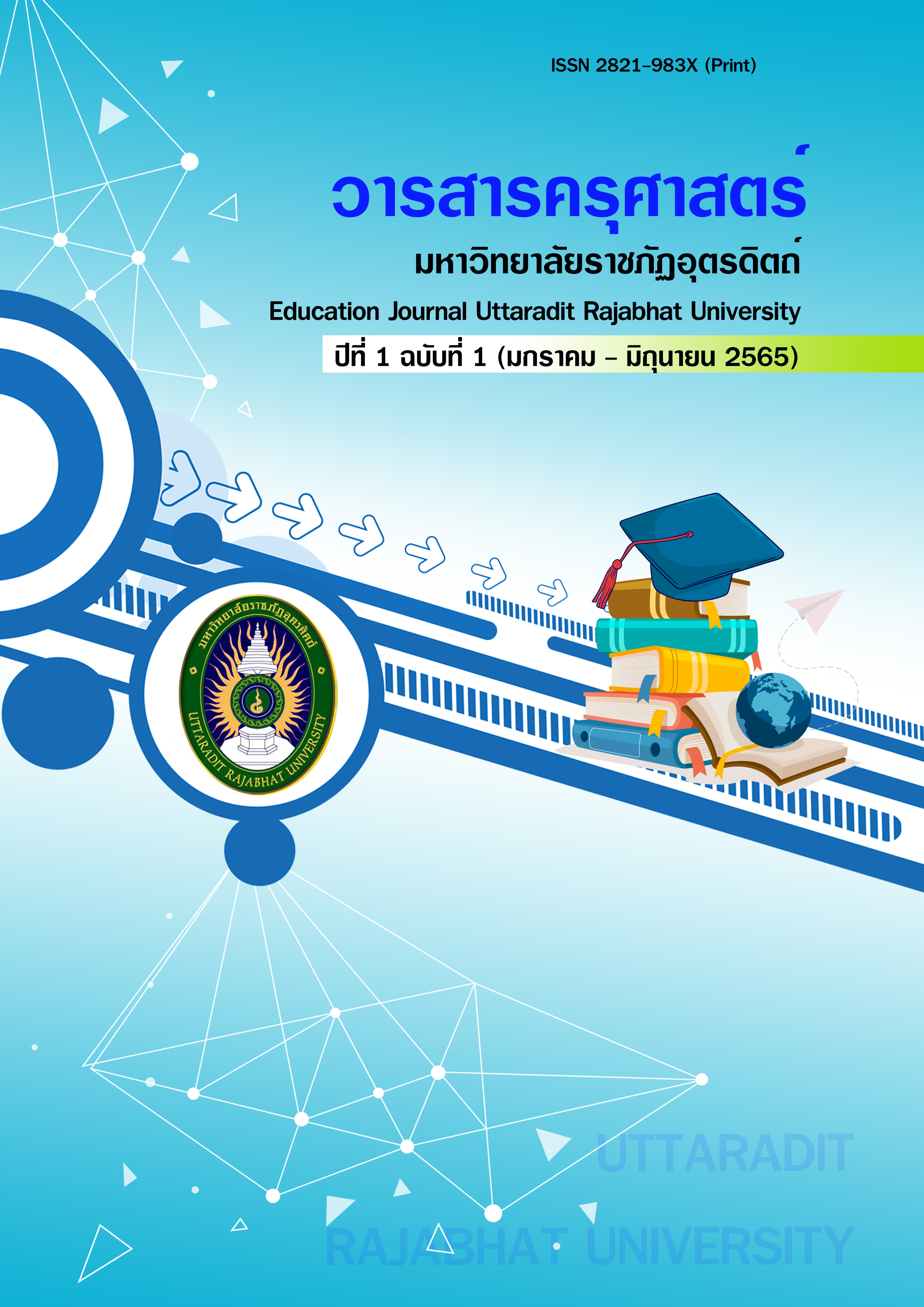Innovative Role-Playing Game-Based Mathematics Instruction
Main Article Content
Abstract
This pre-experimental, one-group pretest-posttest design research study was intended to develop a role-playing game and determine its efficiency for mathematics instruction, to examine the students’ achievement after receiving the innovative RPG-based instruction, and to study the students’ satisfaction toward the innovation. The study population consisted of nine Matthayom suksa 1 students of Baan Huai Tai School in the academic year 2019. The instruments used for data collection included an innovative role-plying game for mathematics instruction, a pre and post-test and a satisfaction questionnaire.
The result showed that the innovations had an efficiency value of 82.8/75.5. The students who received the innovation-based instruction showed an increased effectiveness index by 53.06 percent. Overall students’ satisfaction toward the innovation was at the highest level (μ=4.60, σ=0.58).
Article Details

This work is licensed under a Creative Commons Attribution-NonCommercial-NoDerivatives 4.0 International License.
Faculty of Education Journal Uttaradit Rajabhat University It is a medium for disseminating research results. Academic work Any opinions expressed in the article are solely the personal opinions of the author. Faculty of Education Uttaradit Rajabhat University and the editorial team does not necessarily have opinions that are consistent with those expressed in the article in any way. and is not considered the responsibility of the Faculty of Education Uttaradit Rajabhat University and editorial team
References
กระทรวงศึกษาธิการ. (2551). หลักสูตรการศึกษาขั้นพื้นฐาน พุทธศักราช 2551. กรุงเทพฯ: โรงพิมพ์คุรุสภาลาดพร้าว.
พิมพันธ์ เดชะคุปต์ และพเยาว์ ยินดีสุข (2551). ทักษะ 5C เพื่อการพัฒนาหน่วยการเรียนรู้และการจัดการการสอนแบบบูรณาการ. (พิมพ์ครั้งที่ 6). กรุงเทพฯ: โรงพิมพ์แห่งจุฬาลงกรณ์มหาวิทยาลัย.
วุฒิชัย ภูดี. (2563). การสอนคณิตศาสตร์ในยุคดิจิทัล : วิธีการและเครื่องมือ. วารสารวิทยาศาสตร์และวิทยาศาสตร์ศึกษา, 3(2) : 190-199.
สุไม บิลไบ และศศิฉาย ธนะมัย (2557). เกมส์คอมพิวเตอร์กับการเรียนรู้ยุคดิจิตอล. วารสารวิชาการครุศาสตร์อุตสาหกรรม พระจอมเกล้าพระนครเหนือ, 5(1) : 177 – 182.
สุชาติ วัฒนชัย (2558). การออกแบบการจัดการเรียนการสอนและการเรียนรู้ ในศตวรรษที่ 21. ขอนแก่น:ภาควิชาศัลยศาสตร์และวิทยาการสืบพันธุ์ คณะสัตวแพทยศาสตร์ มหาวิทยาลัยขอนแก่น.
อธิตญา แสงเจริญ และวิลัยพร ไชยสิทธิ์ (2561). การพัฒนาเกมส์คอมพิวเตอร์แบบ RPG เพื่อส่งเสริมการเรียนรู้ทางด้านคณิตศาสตร์ สำหรับนักเรียนระดับชั้นประถมศึกษา. การประชุมวิชาการระดับชาติ ราชภัฎหมู่บ้านจอมบึงวิจัย ครั้งที่ 6 วันที่ 1 มีนาคม 2561. 163-171.
Alessi. S.M. and S.R. Trollip. (1991). Computer – Based Instruction : Methods and Development. New Jersey: Englewood Cliff, NJ. Prentice – Hall, Inc.
Dimitrios, V. & Agoritsa M. (2017). The effect of games and simulations on higher education: a systematic literature review. International Journal of Educational Technology in Higher Education, 14(22) : 1-33.
Doorman, Michiel & Drijvers, Paul & Dekker, Truus & van den Heuvel-Panhuizen, Marja & de lange, Jan & Wijers, Monica. (2007). Problem solving as a challenge for mathematics education in The Netherlands. ZDM. The international journal on mathematics education, 39 : 405-418.
Hawkes-Robinson, William. (2008). Role-playing Games Used as Educational and Therapeutic Tools for Youth and Adults. Retrieved August 2, 2021, from shorturl.at/ho235
Shafie, A., & Ahmad, W. (2010). Design and Heuristic Evaluation of MathQuest: A Role-Playing Game for Numbers. Procedia - Social and Behavioral Sciences, 8 : 620-625.
Wan Fatimah, W.A, Afza S, Hezri A.L. (2010). Role-Playing Game-Based Learning in Mathematics. Notes in The Electronic Journal of Mathemtatics & Technology 4(2). Retrieved August 2, 2021, from shorturl.at/dmL25


